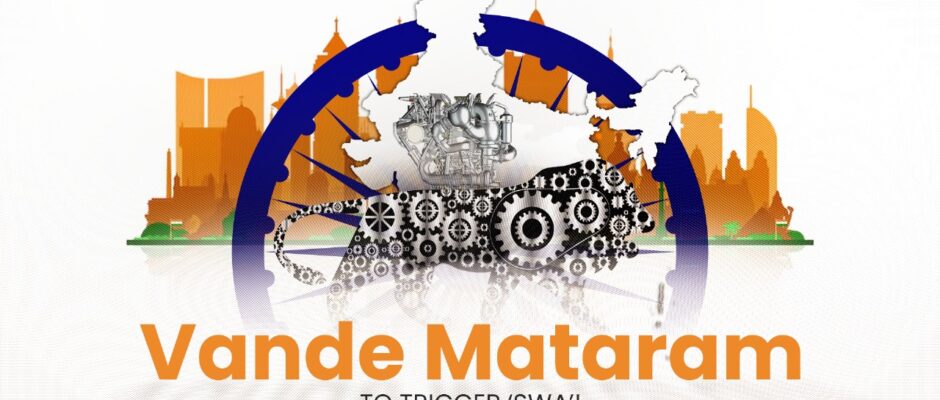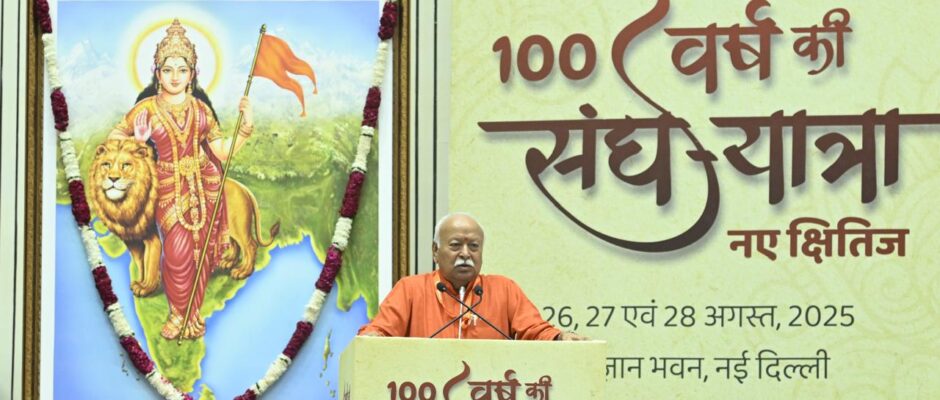
Vande Mataram to Trigger ‘Swa’!
From home grown tech, goods, services to Bharat’s way of resolving her problems would celebrate the spirit of ‘Swa’ to’swadeshi’! K.A.Badarinath The national song ‘Vande Mataram’ that caught the imagination of all freedom fighters for united Bharat against British occupation seeking ‘swaraj’ a la self-rule has turned 150. Bankim Chandra Chattopadhyay penned the verses in 1875 and this became the swan song for complete freedom and rejection of foreign rule, goods and services. This very song can serve as inspiration for a united, developed country of 1.5 billion people overcoming both internal and external challenges. And, rightly, central executive council of Rashtriya Swayamsevak Sangh (RSS) that held three-day conclave in Jabalpur earlier this week announced one-year long campaign to celebrate and revive the spirit of ‘Vande Mataram’. It was first voiced at the Congress session in 1896 by none other than Bharat Ratna Rabindranath Tagore. And, the delegates at Congress session were swayed by this national song. It also turned the ‘mantra’ against British and sung by icons like Maharashi Arbindo, Madame Bhikaji Cama, renowned poets like Subramanya Bharati, Lala Hardayal and Lala Lajpat Rai apart from reformers like Dayananda Saraswati. Mahatma Gandhi had deftly used ‘Vande Maataram’ to greet people even in his letters to fellow compatriots and freedom fighters. When ‘Vande Mataram’ turned 100, ironically, the Congress-led government restricted its singing in 1975 after then Prime Minister Smt Indira Gandhi imposed internal emergency, trampled upon citizens’ fundamental and democratic rights. Most democratic institutions including both houses of parliament were dissolved and began two-year near lunatic undemocratic rule to stay in power. Hence, the entire Sangh parivar that bore the brunt of a criminal rule in New Delhi, seems to have decided to ring in the spirit of ‘Vande Mataram’ after 50-years. The national song treated on par with national anthem is sought to reunite the entire country’s citizenry against divisive forces seeking to weaken the fundamentals of the society on lines of caste, creed, sex, region, religion and faith. ‘Vande Mataram’ has the big potential to rekindle the spirit of ‘Swa’ (selfhood) and ‘Bharatiyata’ (Indian-ness) against forces of disruption having linkages with foreign powers. From villages, counties, communities to the entire nation, Vande Mataram could inject the sense of belonging for Bharat, resurrect its civilizational ethos, celebrate its diversity and unite to become a developed country laying a firm path for other nations to move along as well. RSS Sarkaryavah Dattatreya Hosabale has emphasised on reviving the spirit of ‘swa’ as the basis for national renaissance, development and bringing about inclusive prosperity in Bharat setting aside differences within some sections. ‘Swa’ includes reliance on domestic resources, talent, ideas, innovations and technology that could define Indian-ness. For instance Sridhar Vembu’s arattai can be our basic communication medium as against Whatsapp. For instance, building our own Kaveri engine that can power passenger and fighter aircraft should be our priority as against building Russia’s SJ-100 aircraft. As Dattatreya Hosabale said, ‘Swa’ or ‘Swadeshi’ should not translate into complete ‘isolation’ from Bharat’s perspective. It only means that heavy dependencw on domestic resources, desi talent, home grown technologies, innovations and human mind. From aerospace engineering, defence production to information technology, self-reliance should become the key word in spirit, content or processes. Puritan ‘Swadeshi’ way coupled with multiple global partnerships would bring about resilience to Bharat’s campaign for her socio-economic renaissance. One is reminded of Russia buckling under US pressure to deny Bharat the cryogenic engines technology to power her rockets and missiles. Russian space agency Glavcosmos revised its 1994 pact with Indian Space Research Organisation (ISRO) to deny the cryogenic engines technology and limited to supply nine engines. And, ISRO scientists outflanked the global space powers to rise from ashes and dominate the space sector. Big positive in this campaign is also Narendra Modi led government’s move to join the parivar campaign on ‘Vande Mataram’. If the recent Home Ministry memorandum is any indication, Prime Minister Modi will lead the nation to rekindle the spirit of ‘Vande Mataram’ way on Friday, November 7 that’s Akshay Navami. Last month itself, Union Cabinet had through a resolution decided to celebrate ‘Vande Mataram’ till November 7 next year. This campaign would become more purposeful if the governance at every level adapts ‘swadeshi’ as the ‘mantra’ Overtaking Japan or Germany, competing for the top of the stack position vis-à-vis China and US on economic front is a doable project if the spirit of ‘swa’ in every sector was applied. From governance reforms to celebrating diverse languages of Bharat’s people, governments, political formations and leadership will play a significant role. (Author is Director & Chief Executive of New Delhi based non-partisan think tank, Centre for Integrated and Holistic Studies)

